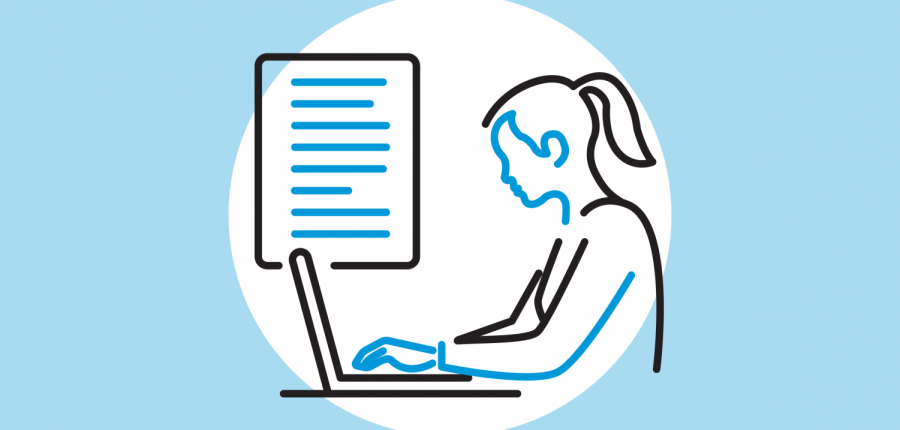Teachers Respond to 2020 AP Exam Changes
May 7, 2020
Nine days after Eleanor Roosevelt’s closing due to COVID-19 concerns, students were notified by the College Board that the 2019-2020 AP tests will be “45-minute online free-response exam(s) at home.”
The College Board “surveyed 18,000 AP students and 90% indicated they want to complete this important step.” On AP Central, it was assured that students would be provided with “free resources through exam day” and “any students already registered for an exam can choose to cancel at no charge.” The AP exams will exclude units taught beyond early March. Although the tests are open book/open note, students can not simply copy and paste answers. They will be expected to apply information within the 45-minute time crunch: “the more time you spend looking for information, the less time you’ll have to use it.” The AP teachers of Eleanor Roosevelt have shared their thoughts on this year’s unconventional approach.
Mr. Richard Renyer, an AP World History teacher since 2001-2002, has taught the course since the first year it was offered. “I wasn’t terribly surprised that College Board has chosen an online format for testing this year. With all the uncertainty associated with COVID-19, it was pretty much the only thing they could do this year.” Dr. Yau Jong Twu, an AP Physics C teacher of 21 years, thought it was “a necessary and expected decision.”
Ms. Andrea Short, an AP Language and Composition teacher of 5 years, shared a different perspective on the change. “I was surprised and even a bit confused by their decision to implement an online exam. The International Baccalaureate (IB) program is comparable to AP and they cancelled the IB exams. I understand the desire for students to have the opportunity to earn college credit by passing the exam, but I have a lot of questions about this new format.”
When asked whether the new exam would test a student’s knowledge of a course accurately, the teachers shared mixed feelings but acknowledged the difficulties of this unprecedented time. Mr. Renyer shared that he was unsure due to the additional format change the AP World History course has undergone in the 2019-2020 school year. “One of the big reasons for my uncertainty is that this year is the first year of the New AP World History: Modern course and there are a lot of changes to wrap your head around. The exclusion of Multiple-Choice Questions does concern me, but I am interested to see how this new format will work.”
As for the AP Language test, there was less concern due to the nature of the English exam. “It is more of a skills test and not so much a content test. A free response question (essay) would test the student’s ability to write and that is the focus of this course. I honestly think that works in favor of most of our students because many of them find the multiple choice section to be the most challenging.” Ms. Short encourages all students to take the AP Lang exam. “It actually seems like this version of the test will be much easier. 45 minutes instead of 3+ hours and no multiple choice questions. AP English students at our school are more than prepared to complete a 45 minute written assessment.”
Dr. Twu pointed out that the exam format was made to “make things work.” She also brought up that this is not new for the College Board: “colleges have accepted a shortened AP Exam for college credit when groups of students have experienced emergencies.” As the entire globe experiences a devastating and troubling “emergency” right now, teachers have been attempting to guide their students through “normal” events like AP exams in an abnormal time.
The teachers agreed that online courses are good supplements and effective solutions, but do not replace face to face interactions in the high school setting. For students who may feel less motivated or discouraged by the circumstances, the teachers would like to send helpful and uplifting advice. Mr. Renyer recommends to “read, take good notes, ask questions when you have them, and utilize the College Board AP Classroom. That is going to be the best resource this year to prepare for these modified exams.”
Dr. Twu sent words of encouragement to physics students who are struggling to cross the finish line. “You are almost there. You have worked hard all year, keep it up, so your AP exam scores can properly reflect how much you have learned. I know physics is a difficult subject, but my students usually end up realizing they have learned much more than they thought they did.
Hopefully our unusual challenging circumstances have helped you get enough sleep each day. Remember, you do better on exams when you get enough sleep : ) And please take advantage of the AP YouTube channel which provides free daily AP Review Classes.”
Ms. Short shared her opinion on remote learning to emphasize the connection teachers try to build with their students during this isolating time. “Above any instructional tool or strategy, relationship building is the most important aspect of teaching. I already miss engaging with my students. I have been checking in with them, but it isn’t the same as seeing them every day. I can look at one of my students and tell if their vibe is off or if they need some extra love and attention that day.”
The degree to which the changes impact AP exams may depend on the class and subject, but the uncertainties that come with it prevail in the minds of AP students. However, it is important to note that no one is alone when they look towards their future and see a configuring question mark.




